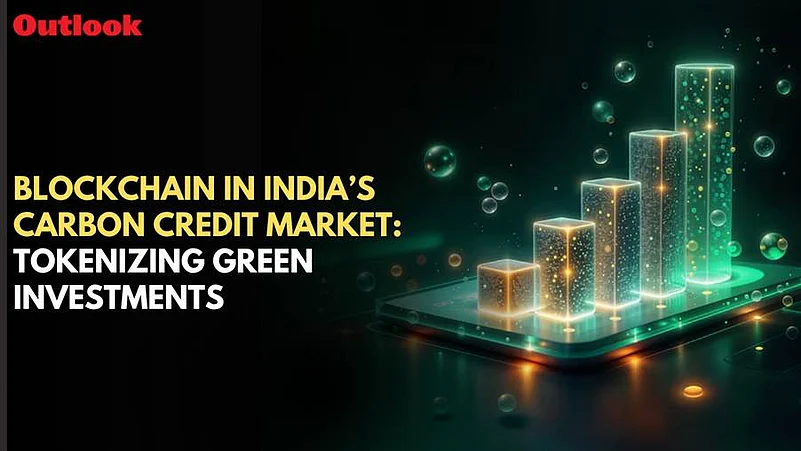India is taking enormous leaps towards the fulfillment of its climate goals. With the country poised to reduce carbon emissions and embrace green energy, one of the rapidly growing niches is the market in carbon credits. Carbon credits are units that allow businesses to produce a specified amount of carbon dioxide. If they produce less than the quota permitted, they trade in the excess credits to other companies. This creates a financial incentive for companies to pollute less and invest in green technology.
But in order for the carbon credit market to function effectively, there must be trust, transparency, and traceability. That is where blockchain technology comes in.
What is Blockchain and Why Does It Matter Here?
Blockchain is a digital system where transactions are stored in a way that cannot be changed or erased. Transactions are stored in blocks and linked like a chain. Since all members in the network have access to the same information, it is based on trust without a central authority.
With blockchain and carbon credits, the issuance, buying, and selling of them can become more transparent. Blockchain can track every stage of the life of a carbon credit, from the time it is created to the time it is utilized or retired. That solves one of the biggest issues with conventional carbon markets: double counting and fraud.
With blockchain, India can guarantee that each carbon credit is unique, verified, and utilized once. This helps to promote investor and company trust in buying carbon credits for clean initiatives towards energy.
Tokenizing Carbon Credits: What Does It Mean?
Tokenization is the process of converting physical assets into digital tokens on a blockchain. Here, a single carbon credit can be represented as a digital token. The tokens are easily and safely sold on the internet.
Carbon credits, once tokenized, can be sold more easily to more investors aside from corporations. Small companies, individuals, and foreign buyers are more easily able to invest in the carbon market. This allows more capital to flow towards climate-friendly projects like solar farms, wind farms, and reforestation projects.
Tokenization also makes it simple to divide carbon credits into smaller pieces. Instead of paying for a behemoth credit for one ton of CO2, for example, someone can buy part of it. The ownership by fractionalization causes micro-investments in the green initiatives.
India's Push for Green Finance and Digital Innovation
India has already pledged to be Net Zero by 2070. For that, the government is going all-out on clean energy, green industry, and digital infrastructure. In that process, blockchain is being looked into not just in the financial space, but also in agriculture, supply chains, and environmental markets now.
The Indian government is also dedicated to creating platforms and regulatory frameworks for the trading of carbon credits. The Ministry of Power and the Bureau of Energy Efficiency are spearheading the efforts to create a domestic carbon marketplace. With the proper policies launching the system, blockchain can be incorporated within the system from inception and avoid the pitfalls experienced in other nations' traditional carbon markets.
Advantages of Blockchain in India's Carbon Credit System
The advantages of using blockchain in India's carbon credit system are many. It makes the system more transparent, traceable, and tamper-proof. It allows real-time tracking of issuing and transferring of credits, ease in audits. It builds confidence between parties by reducing fraud or data-tampering risks.
Most importantly, it can attract new categories of investors. Digital carbon credits can be exchanged on exchanges, listed on platforms, and even be part of ESG portfolios. It can position India as an Asian hub for sustainable finance.
Challenges to Consider
While providing the potential for applying blockchain tech to the carbon market, caution needs to be exercised in that there are issues that must first be resolved. To begin with, infrastructure in the market is only just starting to take hold. Regulator clarity as to whether or not tokenized carbon credits are legal and compliant and available to be purchased by buyers must be provided.
There are technical hurdles as well. The blockchain platforms themselves have to be energy-conscious, especially in an industry that has sustainability issues. Luckily, newer blockchain technology uses a lot less electricity than older generations of computers.
Public understanding is another issue. The vast majority of people still have no idea how blockchain or carbon credits function. Educational programs and easy tools have to be employed to de-mystify these systems and to offer them to individuals.
The Road Ahead
India stands at the nexus of two powerful global trends: climate action and digital innovation. By leveraging both, the country can become a world leader in creating an open, efficient, and inclusive carbon credit market.
Blockchain is not a silver bullet, but it's a fantastic tool. With appropriate planning and support, it will be a force that will enable India to reach its climate goals, attract green investment, and create a cleaner, greener future.
As India contemplates the possibility of tokenizing carbon credits, the most critical factor might be to develop infrastructure that is not only technologically suitable but also available to all바카라”large corporations to common citizens. Blockchain has the ability to help India unlock its climate challenges and convert them into drivers of growth and innovation if done so.














